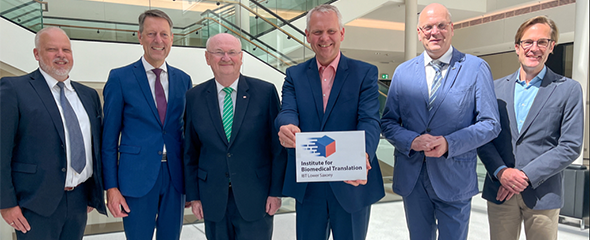The federal state is providing a budget of 25 million euros for the new biomedical network for the years 2022 to 2026 via the “Niedersächsisches Vorab” initiative of the Volkswagen Foundation. The founding institutions of the IBT are the Hannover Medical School (MHH), the University Medical Center Göttingen (UMG) and the Helmholtz Centre for Infection Research (HZI) in Braunschweig.
Prof Thomas Pietschmann, program spokesperson of the Helmholtz Centre for Infection Research and Institute Director at TWINCORE - Centre for Experimental and Clinical Infection Research: "At TWINCORE, a joint facility of the HZI and MHH, the focus is particularly on translational infection research - i.e. the interface between basic research and clinical development. I expressly welcome the fact that the IBT will further strengthen the framework conditions for translation."
Prof Dirk Heinz, Scientific Director of the Helmholtz Centre for Infection Research: "The foundation of the IBT is an important step at the right time: The targeted support of the transfer of results from basic research into application will not only strengthen the outstanding biomedical research taking place in Lower Saxony, but also pave the way for new spin-offs and cooperations with industrial partners. In this way, the IBT can directly contribute to addressing some of the major health challenges our society is facing."
To the press release on the website of the Ministry of Science and Culture in Lower Saxony (in German).
Background:
The new "Institute for Biomedical Translation" (IBT) is intended to bring together and enhance the existing strengths of the Hannover-Braunschweig-Göttingen-Wolfsburg metropolitan region and other associated locations in the key areas of infectious medicine, organ repair or replacement and neuroscience. The core objective is to transfer research results as quickly as possible into new preventive, diagnostic and therapeutic procedures - for example through approaches of personalised medicine - but also innovative formats such as digital public health applications. In addition to cutting-edge biomedical technologies, data-based methods such as machine learning and artificial intelligence are to be used in particular.
The institute is based on two pillars:
- The "IBT Incubator" is intended to increase the technological maturity of selected translational projects in a targeted manner in order to create transfer points to further industrial development as efficiently as possible. Industrial partners and investors are to be involved in the projects at an early stage.
- The translational ecosystem in Lower Saxony is to be sustainably strengthened and specifically expanded via "IBT Exchange". The primary focus is on the targeted promotion of a new generation of translationally oriented developers through a multi-layered exchange between academic institutions and industrial partners. On the one hand, this dialogue is intended to dissolve traditional thought patterns that view research, development and commercialisation as separate entities, and on the other hand, at the same time, to close training gaps for young professionals in the field of biomedical translation.
